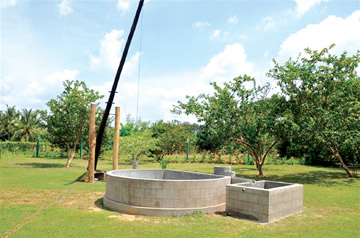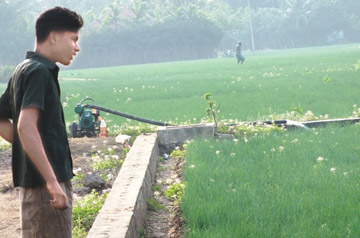Jaffna ground- water contamination, life threatening
By Dhaneshi Yatawara
The demands for safe drinking water has risen in the Jaffna
peninsula. Protests leading to hunger strikes in the area reveals the
severity of the problem. School children, teachers, university academics
and people from all communities have joined the protests.
Ground water
|

Groundwater |
The ground-water in the limestone aquifer is the main source of water
for the area. Aquifers are underground layers of rock that are saturated
with water which could be extracted through natural springs or pumps.
Aquifers are naturally refilled mainly by rain but the refilling level
in Jaffna is slowing down, according to researchers. The district is
predominantly an agricultural area with a large extent of commercial
crop cultivation such as red onions, chilies, potatoes, tobacco,
vegetables, bananas and grapes. With this there is a huge demand for
water and without any rivers and tanks in the plains, ground water is
heavily pumped out for agricultural needs. Rapid development of
agriculture, economy and increase of population due to resettlement have
increased the use of of water. Scientists fear that Jaffna's limestone
aquifer will become depleted over the years leaving no fresh water on
the peninsula.
This is why the contamination of the Jaffna ground water becomes a
severe problem. Early last week reports flooded the media stating the
ground water in the Chunnakam area (Walikamum general area) is
contaminated with crude oil and people are protesting. People were
complaining that the water smelt like crude oil and a substantial number
of wells were showing signs of contamination.
The Jaffna Peninsula, falls within the dry zone and is underlain by
Miocene limestone that is considered to have appropriate aquifer
properties for groundwater storage and discharge, according to the
report on Jaffna water condition researched and compiled by Dr.
Thushyanthy
Mikunthan, Dr. Meththika Vithanage, Dr. S. Pathmarajah, Mr. Ranjith
Ariyaratne and Dr. H. Manthrithilake. The report notes that "The absence
of perennial rivers or major water supply schemes to the peninsula
highlights the importance of groundwater as the predominant water
resource for domestic, industrial and agricultural use. The seasonal
rainfall has a short duration and it is the only means to refill the
limestone aquifer." According to research the Jaffna peninsula has four
main aquifer systems, such as the Chunnakam (Valikamam area),
Thenmaratchi, Vadamaratchi and Kayts, of which the Valikamam area is
intensively cultivated in the Jaffna Peninsula.
 |
The report also highlights the importance of an assessment of the
vulnerability of groundwater for irrigation and drinking purposes has
become an important task for the management of present and future
groundwater quality in the Chunnakam aquifer. In a country like ours,
where fresh water is still abundant shortage of water can be felt less.
Yet those who face the ground reality understands the gravity.
Fresh water
Being brought to the attention of the Government steps have been
taken to supply fresh water to people. According to Jaffna District
Secretary Suntharam Aruminayaham fresh water is supplied to the affected
areas from bowsers. "Water tanks are filled daily and people store water
in large containers. Daily over 250 water tanks are filled," said
Aruminayaham. These large tanks are set up by the District Secretariat
to provide water for the people.
A special committee is being set up joining the District Secretariat,
provincial minsitries of Agriculture and Health to find a solution to
this problem. "While there are tests and researches are going on to find
the long term solution for the problem we are also looking in to short
term solutions to provide fresh water for people's daily use," he said.
According to Aruminayaham tests are done with the assistance of the
National Water Supply and Drainage Board.
People and environmentalists accuse the 'Northern Power' power plant,
which depends on fossil fuel to generate electricity.
The Northern Power Company Ltd. issuing a press statement denied
these allegations saying that the oil 'lake' in the previously state-run
power plant which commenced its work recently could be the cause. In the
press release the Northern Power Company Ltd. states that, "This 'lake'
contained a large amount of oil as indicated even in the Google maps
taken over a period of time and has been presented to Courts as well.
Subsequently around 2012 the area was filled with earth and a new
substation was built by the Government on this premises. Unfortunately,
to date no one has questioned or researched in to finding out what
happened to this large quantity of oil that was contained in this 'oil
lake'."
The newly recommenced Government owned power plant, 'Uthuri Janani'
and 'Nothern Power' are the power generating establishments that provide
electricity to the Jaffna Peninsula. Amidst these controversies people
still face the problem.
Problem
Still there is lack of water for daily needs.A proper unbiased
investigation is compulsory to find the sustainable solution. Since
Jaffna had heavy rains last weeks there is a high possibility for the
pollution to spread fast in to other areas.
"To achieve a sustainable transformation, a comprehensive feasibility
study will be an important step," said Dr. Herath Manthrithilake, Head,
Sri Lanka Development Initiative of the International Water Management
Institute (IWMI). IWMI lead numerous researches on the water quality of
Sri Lanka and one specific study area is the Water in the Jaffna
peninsula.
Its not only crude oil pollutants that have crept in to the well
water. The research done by Dr. Thushyanthy Mikunthan, Dr. Meththika
Vithanage, Dr. S. Pathmarajah, Mr. Ranjith Ariyaratne and Dr. H.
Manthrithilake also identified high levels of nitrates in the wells,
particularly the agro wells - known as 'andiya' wells with its unique
lever structure. The report states that 'Since, most of the farm wells
are located inland; their water quality is generally superior to
domestic and public wells.
However, farm wells contain nitrate-N levels that are above
acceptable levels for drinking purposes." Elevated levels of electric
conductivity due to the presence of high concentrations of ions in the
ground water, nitrates and low levels of fluoride were identified in
comparison with Sri Lankan drinking water standards in the Chunnakam
aquifer.
The level of nitrate-N concentration in water was influenced by the
cropping system, as a high nitrate-N concentration in groundwater was
observed in the cultivation of highland crops followed by banana and
paddy.
The scientists also argue that this can be aggravated with excessive
use of water in these plantations which inevitably happens in the dry
weather. According to this research done a few years ago high levels of
pollution in ground water due to heavy use of agro chemicals had been
evident - though with in the WHO limits on Arsenic.
Ground water contamination in the Valikamam area of the North,
particularly in the Chunnakam area has directed the attention of
authorities towards the ground water situation of the entire country.
There is a persisting problem in the ground waters of the entire
country, according to experts. the changing rainfall patterns due to
Climate Change will impact Sri Lanka's groundwater aquifers.
Not only the drought, but intense rain during a short period of time,
will also disturb groundwater recharging cycles, as it will not allow
rain water to leach down, but runoff quickly into rivers.
The presence of buildings prevents rainwater from leaching, hence
leaching in urban areas is severely reduced, which slows down
groundwater recharge, while groundwater extraction for commercial
purposes is increasing. Hence, there should be solution to the
groundwater isse, water experts said. |

